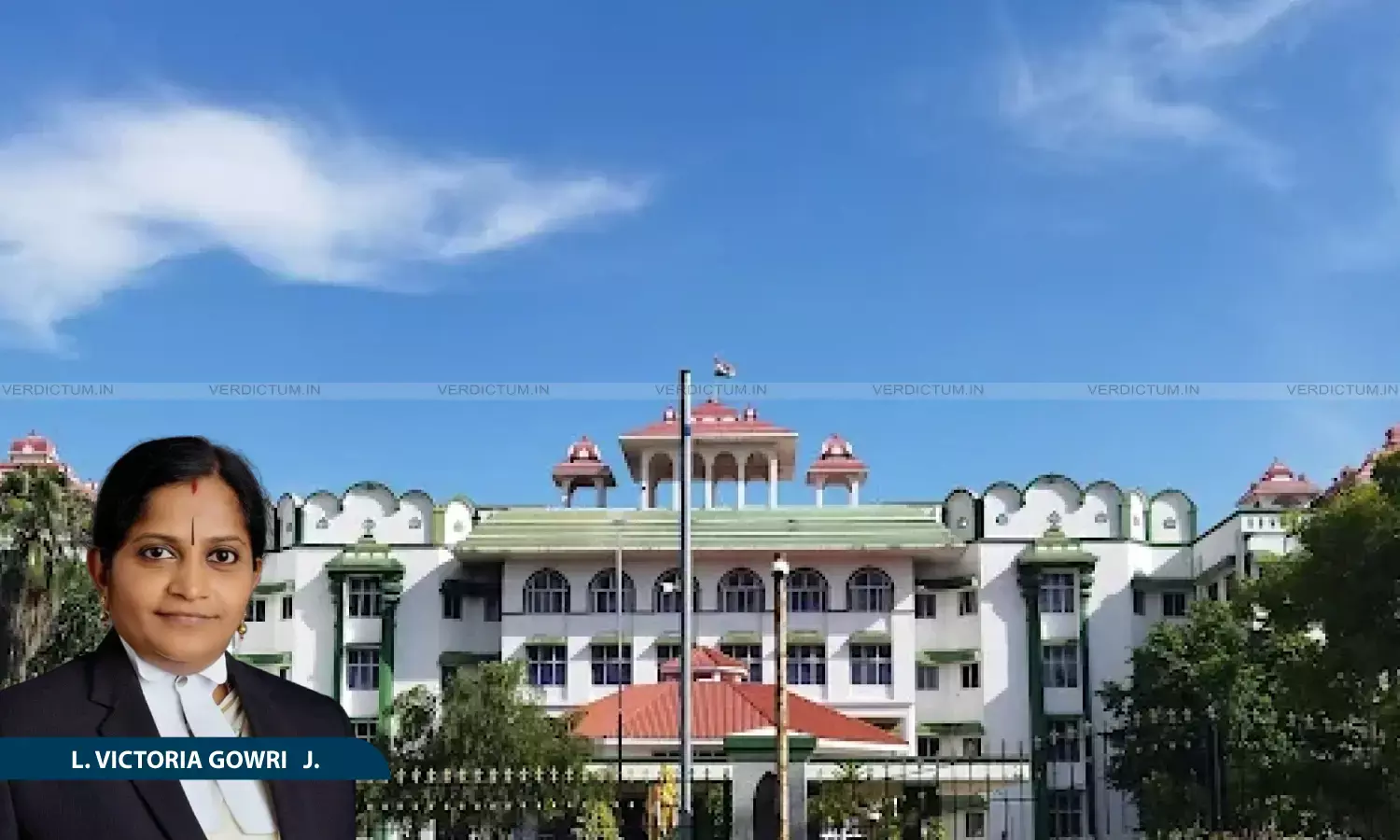Open-Ended Money Deposit Condition In Bail Order Unsustainable As It Converts Bail Into A Restitutionary Mechanism: Madras High Court
The High Court held that the direction requiring the petitioner to deposit additional amounts “as per requirement” is unbounded in quantum and time risks becoming punitive by converting bail into a running restitutionary mechanism.

Justice L. Victoria Gowri, Madras High Court, Madurai Bench
The Madras High Court has held that a bail condition requiring the petitioner to deposit additional sums “as per requirement” if the initial amount is found insufficient is legally unsustainable.
The High Court observed that such an open-ended direction bears no connection with the statutory purposes of bail and effectively transforms bail into an instrument to address disputed claims reserved for trial or civil adjudication.
The Court was hearing a criminal revision challenging certain conditions imposed by the Sessions Court while granting bail.
A Single Bench of Justice L. Victoria Gowri examined the nature of the impugned conditions, including the open-ended monetary requirement that formed Condition No 4 of the said bail order and held: “Condition No.(iv) that if the initial deposit is insufficient, the petitioner “should deposit the additional amount as per requirement” is unbounded in quantum and time, bears no nexus with securing presence or preventing interference with investigation, and effectively converts bail into a running restitutionary mechanism pegged to disputed claims which are matters for trial/civil process. Left untouched, this clause risks becoming punitive, may cripple defence, and pre-judges liability contrary to the presumption of innocence”.
Senior Advocate Isaac Mohanlal appeared for the petitioner. Additional Public Prosecutor S. Ravi represented the respondents.
Background
The petitioner, who served as founder and Principal of an institution, was implicated in a crime registered for offences under the Bharatiya Nyaya Sanhita and the Tamil Nadu Prohibition of Harassment of Women Act. Allegations included running unrecognised Electro-Homoeopathy courses, misrepresentation of affiliation, and collection of substantial fees.
The Sessions Court granted bail subject to several conditions. These included a deposit of Rs. 40,00,000/- with the District Legal Services Authority for refund to students wishing to exit, and Condition No. (iv), which required the petitioner to make further deposits “as per requirement” if the initial sum proved insufficient.
A DLSA report placed before the High Court indicated that Rs. 40,79,400/- had been disbursed to 201 students, with approximately forty applications pending for want of particulars. A balance of Rs. 10,20,600/- remained.
The High Court suo-motu impleaded additional respondents, including the Ministry of Health and Family Welfare and the National Medical Commission, to examine issues relevant to the limited bail-revision question.
Court’s Observation
The Madras High Court, upon examining the record, reiterated the settled law under Section 483 BNSS, pari materia with Section 439 Cr.P.C., that while courts may impose conditions to secure the presence of the accused, prevent tampering, or ensure orderly investigation and trial, bail conditions cannot be punitive, compensatory, or pre-adjudicatory. The Bench referred to the decisions of the Supreme Court in Sumit Mehta v. State (NCT of Delhi) and Satender Kumar Antil v. CBI, wherein the imposition of onerous or excessive monetary conditions has been held impermissible.
The Court examined the Sessions Court’s Conditions (ii) to (iv) and noted that the petitioner did not challenge disbursals already made. Conditions (ii) and (iii), relating to the return of documents and processing of exit-refund claims, were viewed as interim, student-centric measures that could continue with safeguards to prevent prejudice.
However, Condition No. (iv) drew specific scrutiny. The Bench held that civil and statutory avenues exist for adjudicating disputed claims and that converting bail into a perpetual replenishment mechanism is inconsistent with the nature and purpose of bail.
The Bench also noted that selective action against one institution amidst a wider field of similarly placed entities would undermine uniformity and create uncertainty, though the present order was confined to the bail question.
The Bench proceeded to restructure the conditions to ensure that they remained within the statutory framework. It directed that disbursals henceforth be made only from the existing corpus of Rs. 51,00,000/- and accrued interest, without requiring fresh deposits.
Verification steps were prescribed to ensure that claims are processed through the DLSA on an administrative, non-adjudicatory basis. The remaining balance was ordered to be placed in a short-term auto-renewal deposit tagged to the crime number.
Conclusion
The Madras High Court partly allowed the criminal revision. Condition No. (iv) of the Sessions Court’s order, requiring the petitioner to deposit additional sums “as per requirement,” was set aside as onerous and beyond the legitimate purposes of bail. Conditions (ii) and (iii) were retained with modifications ensuring fairness and procedural safeguards. All other bail conditions were left undisturbed.
The Court clarified that the order would not affect questions concerning recognition of any system, legality of courses, alleged misrepresentation, or determination of civil or criminal liability, all of which remain open for adjudication at trial.
Cause Title: Tikat Jackson @ Diccot Jeckson v. State of Tamil Nadu & Others
Appearances
Petitioner: Senior Advocate Isaac Mohanlal
Respondents: K. Govindarajan, Deputy Solicitor General of India, S. Ravi, Additional Public Prosecutor, Subharanjani Anand, Standing Counsel, Advocates B. Saravanan and B. Nagarajan


